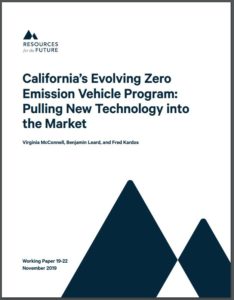Full Title: California’s Evolving Zero Emission Vehicle Program: Pulling New Technology into the Market
Author(s): Virginia McConnell, Benjamin Leard, and Fred Kardos
Publisher(s): Resources for the Future
Publication Date: November 20, 2019
Full Text: Download Resource
Description (excerpt):
California’s Zero Emission Vehicle (ZEV) program is one of the key state-level policies for reducing greenhouse-gas (GHG) emissions from the transportation sector. Since its inception nearly 30 years ago, the original goal of the program was to reduce local air pollution caused by gasoline vehicles, but it evolved to also target reduction of GHG emissions. The ZEV program represents a unique policy approach to achieving these goals—to require sales of vehicles with new technologies that have zero emissions. We review the history and performance of the ZEV program and evaluate prospects for the new, more stringent phase of the effort. We document numerous and significant changes to the design and stringency of the program. We also estimate values of ZEV credits traded among manufacturers. Our review leads to suggestions for improving the economic efficiency of the program. In particular, our review suggests that the program should provide manufacturers with additional compliance flexibilities—such as a safety valve—to prevent the need to ratchet back stringency levels.
